Department of Ayacucho
Ayacucho (Spanish pronunciation: [aʝaˈkutʃo] (![]()
Department of Ayacucho | |
|---|---|
Region | |
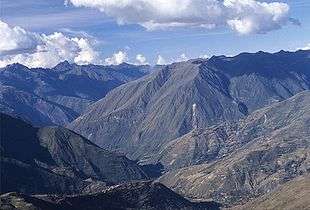 The Andes in the Department of Ayacucho | |
 Flag 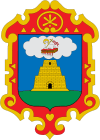 Seal | |
.svg.png) Location of the Department of Ayacucho in Peru | |
| Country | Peru |
| Subdivisions | 11 provinces and 111 districts |
| Largest city | Ayacucho |
| Capital | Ayacucho |
| Government | |
| • Governor | Carlos Rua Carbajal (2019–2022) |
| Area | |
| • Total | 43,814.8 km2 (16,917.0 sq mi) |
| Elevation (Capital) | 2,746 m (9,009 ft) |
| Highest elevation | 5,505 m (18,061 ft) |
| Lowest elevation | 1,800 m (5,900 ft) |
| Population (2017) | |
| • Total | 616,176 |
| • Density | 14/km2 (36/sq mi) |
| UBIGEO | 05 |
| Dialing code | 066 |
| ISO 3166 code | PE-AYA |
| Principal resources | Potatoes, wheat, olluco, barley, sheep and handicrafts. |
| Poverty rate | 72.5% |
| Percentage of Peru's GDP | 0.65% |
| Website | www.regionayacucho.gob.pe |
A referendum was held on 30 October 2005, in order to decide whether the department would merge with the departments of Ica and Huancavelica to form the new Ica-Ayacucho-Huancavelica Region, as part of the decentralization process in Peru. The bill failed and Ayacucho remained an independent department.
Political division
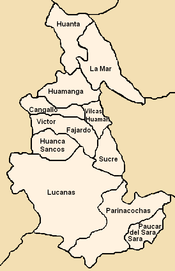
The department is divided into 11 provinces (Spanish: provincias, singular: provincia), which are composed of 111 districts (distritos, singular: distrito).
Provinces
The provinces, with their capitals in parenthesis, are:
- Cangallo (Cangallo)
- Huamanga (Ayacucho)
- Huanca Sancos (Huanca Sancos)
- Huanta (Huanta)
- La Mar (San Miguel)
- Lucanas (Puquio)
- Parinacochas (Coracora)
- Paucar del Sara Sara (Pausa)
- Sucre (Querobamba)
- Víctor Fajardo (Huancapi)
- Vilcas Huamán (Vilcas Huamán)
Demographics
Languages
According to the 2007 Peru Census, the language learnt first by most of the residents was Quechua (63.05%) followed by Spanish (36.57%). The Quechua variety spoken in Ayacucho is Chanka Quechua. The following table shows the results concerning the language learnt first in the department by province:[1]
| Province | Quechua | Aymara | Asháninka | Another native language | Spanish | Foreign language | Deaf or mute | Total |
|---|---|---|---|---|---|---|---|---|
| Cangallo | 29,356 | 24 | 4 | 11 | 3,132 | 3 | 37 | 32,567 |
| Huamanga | 104,644 | 223 | 42 | 118 | 102,452 | 72 | 218 | 207,769 |
| Huanca Sancos | 8,017 | 29 | 1 | - | 1,858 | - | 18 | 9,923 |
| Huanta | 58,333 | 89 | 92 | 40 | 28,184 | 5 | 105 | 86,848 |
| La Mar | 64,815 | 64 | 127 | 58 | 12,950 | 1 | 111 | 78,126 |
| Lucanas | 26,153 | 152 | 7 | 49 | 35,282 | 10 | 78 | 61,731 |
| Parinacochas | 15,491 | 68 | - | 30 | 12,576 | 2 | 29 | 28,196 |
| Paucar del Sara Sara | 5,223 | 19 | 1 | 15 | 5,140 | - | 16 | 10,414 |
| Sucre | 9,059 | 25 | - | - | 2,749 | - | 13 | 11,846 |
| Víctor Fajardo | 20,647 | 37 | 2 | 9 | 3,213 | - | 38 | 23,946 |
| Vilcas Huaman | 19,884 | 14 | 2 | 11 | 2,232 | 1 | 44 | 22,188 |
| Total | 361,622 | 744 | 278 | 341 | 209,768 | 94 | 707 | 573,554 |
| % | 63.05 | 0.13 | 0.05 | 0.06 | 36.57 | 0.02 | 0.12 | 100.00 |
Gallery
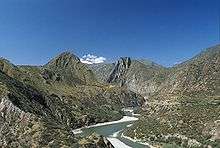 The Andes go across the Ayacucho Region
The Andes go across the Ayacucho Region Statue of Antonio José de Sucre and obelisk near Kinwa, commemorating the Battle of Ayacucho.
Statue of Antonio José de Sucre and obelisk near Kinwa, commemorating the Battle of Ayacucho.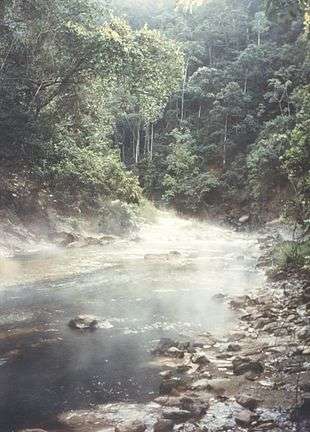 Hot springs in the region of Ayacucho.
Hot springs in the region of Ayacucho. Obelisk near Kinwa, commemorating the Battle of Ayacucho.
Obelisk near Kinwa, commemorating the Battle of Ayacucho.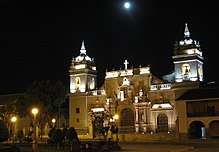 Church of Ayacucho
Church of Ayacucho
Sources
- inei.gob.pe Archived January 27, 2013, at the Wayback Machine INEI, Peru, Censos Nacionales 2007